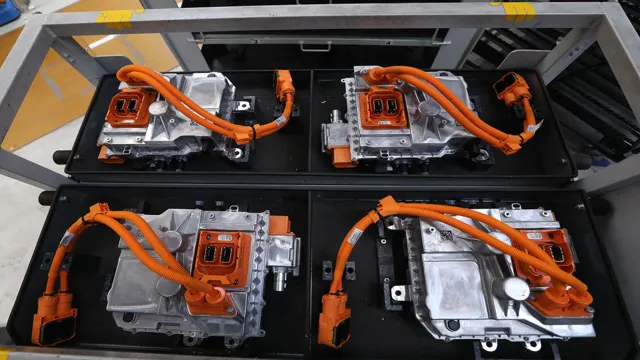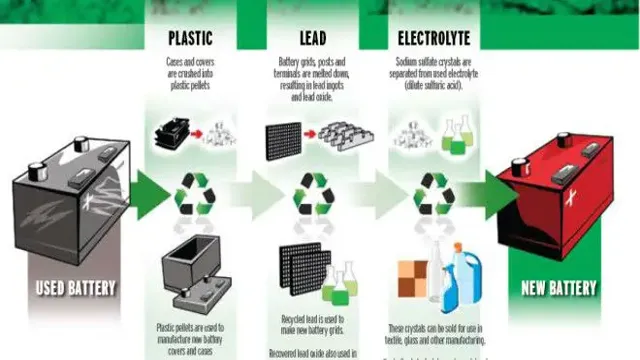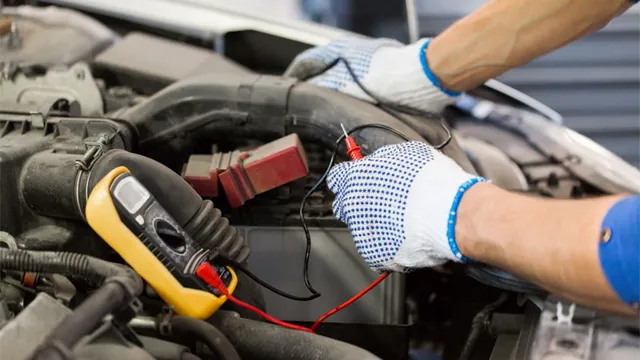Unlock the Future of Sustainable Mobility: The Pros and Cons of Electric Car Battery Ownership
Electric car battery ownership is a topic that has been gaining a lot of attention lately. With the rise of electric vehicles, there is a growing interest in how the batteries work, how to maintain them, and whether owning an electric car is worth the investment. In this blog, we will explore everything you need to know about electric car battery ownership.
We will answer some frequently asked questions, including how long the batteries last, how to care for them, and the costs associated with battery replacement. Whether you are a current electric car owner or thinking about buying one, this blog will provide you with valuable insights into the world of electric car battery ownership. So, buckle up and let’s dive in!
Benefits of Owning an Electric Car Battery
Owning an electric car battery has a multitude of benefits. For one, electric batteries are much more efficient and cost-effective than traditional gasoline engines. They require less maintenance and typically last longer, resulting in savings over time.
Additionally, they produce zero emissions, making them more environmentally friendly. Charging an electric car battery is also very convenient, with fast charging stations becoming more accessible. Electric car batteries are also becoming more powerful, allowing for longer ranges and better performance.
Lastly, owning an electric car battery allows for independence from volatile fuel prices and the ability to generate power from renewable sources. Overall, electric car battery ownership is a wise investment for those looking to save money, reduce their environmental impact, and embrace new technology.
Savings on Fuel Costs
Owning an electric car comes with a host of benefits, and one of them is the savings you get on fuel costs. With gasoline prices skyrocketing these days, owning an electric car battery could be a real game-changer for your budget. Unlike gasoline-powered cars that run on expensive fuel, electric cars utilize battery power to run.
You can recharge your electric car’s battery at home using a standard electrical outlet, or you could opt for faster-charging stations installed in public areas. Either way, you can save a considerable amount of money on fuel costs as you won’t need to visit those gas stations anymore. Plus, electric cars generally have a longer lifespan than gasoline-powered cars, so you’ll get more value for your money in the long run.
If you’re someone who values financial efficiency and environmental friendliness, then owning an electric car battery would be an excellent investment.
Tax Incentives and Rebates
Tax incentives and rebates are just some of the benefits of owning an electric car battery. These incentives can help reduce the cost of purchasing and owning an electric car, making it a financially viable investment for many. In addition to tax incentives and rebates, owning an electric car battery can also help you save money on fuel costs.
With the rising cost of gasoline, electric cars offer a more cost-effective alternative that can help put more money back in your pocket. Plus, with the lower maintenance costs of electric vehicles, you can save even more on repair and upkeep costs over the life of the vehicle. Overall, owning an electric car battery offers a variety of benefits that can help reduce your environmental impact and save you money over time.
Reduced Carbon Footprint
Electric Car Battery Owning an electric car battery has many benefits, one of them being a significantly reduced carbon footprint. An electric car battery generates little to no emissions when compared to traditional gasoline-powered cars. This reduction in emissions not only helps the environment, but also helps combat climate change.
Electric cars also offer the convenience of charging at home or at work, eliminating the need for frequent trips to the gas station. In addition, electric car batteries are efficient and cost-effective in the long term, as they require less maintenance and have lower fuel costs. Imagine always having a full tank of gas, without ever visiting a gas station! Owning an electric car battery is not only good for the environment, it can also save you time and money in the long run.
Factors to Consider When Owning an Electric Car Battery
Electric car battery ownership can be a great option for those who care about the environment or want to save money on gas. However, there are several factors to consider when owning an electric car battery. One important factor is the range of the battery.
If you plan to take longer trips, you will want to ensure that your battery can provide the necessary range and that there are enough charging stations along the way. Another key factor to keep in mind is the cost of the battery. While electric cars can save you money in the long run, the initial cost of the battery can be quite high.
It’s also important to consider the maintenance required for the battery, as well as the overall lifespan of the battery. By taking all of these factors into account, you can determine if owning an electric car battery is the right choice for you.
Battery Size and Charging Time
When it comes to owning an electric car, one of the biggest factors to consider is the battery size and charging time. The battery size determines how much range your car will have on a single charge, and it can vary greatly depending on the make and model of your vehicle. Additionally, charging time is something that needs to be considered as well.
The time it takes to fully charge your car can vary from a few hours to overnight, just depending on the charger speed and the size of your battery. When selecting an electric car, it’s important to choose one with a battery large enough to fit your needs and to have a charging plan in place that works for your lifestyle. With proper planning and consideration, owning an electric car can be a smooth and efficient transition from traditional gasoline-powered vehicles.
Distance Limitations and Charging Availability
When it comes to owning an electric car, there are a few key factors to consider, such as distance limitations and charging availability. Unlike traditional gas-powered vehicles, which can easily be filled up at any gas station, electric cars require access to charging stations. This means that if you’re planning a long road trip, you’ll need to take into account where you can stop to recharge your vehicle.
It’s also important to keep in mind that electric car batteries have limited ranges, so you’ll need to plan accordingly if you’re traveling longer distances. However, the benefits of owning an electric car – such as reduced emissions and lower fuel costs – are worth the additional planning required. With more and more charging stations popping up across the country, owning an electric car has never been more practical.
Maintenance and Repairs
Owning an electric car battery comes with a lot of advantages such as lower running costs, lower emissions, and a smooth driving experience. However, just like any other type of car battery, electric car batteries also require maintenance and repairs. When owning an electric car battery, there are several factors to consider.
Firstly, it is important to keep an eye on the battery’s charge level and to charge it regularly to avoid a complete depletion. Also, the type of charging station used for charging the battery is crucial as it can affect the battery’s lifespan. Another factor to consider is the temperature conditions that the battery is exposed to, as extreme temperatures can have an impact on the battery’s performance.
Finally, one should always keep an eye on the battery status and seek repair or replacement in case of any abnormal behavior. By considering these factors, owners of electric car batteries can ensure that their vehicle always runs smoothly and enjoy the many benefits of owning an electric car.
Tips for Managing Your Electric Car Battery
Owning an electric car battery can be a lot different than owning a traditional gasoline-powered vehicle. To ensure that your battery lasts as long as possible, there are a few tips you should keep in mind. First, try to avoid charging your battery to 100% on a regular basis.
This can cause unnecessary wear and tear on the battery and decrease its overall lifespan. Instead, aim to keep your battery at around 80% charged whenever possible. Additionally, make sure to keep an eye on your battery’s temperature.
Extreme hot or cold temperatures can cause damage to the battery and reduce its capacity. Finally, consider investing in a home charging station to make it easier to keep your battery charged and in good condition. By following these tips, you can ensure that your electric car battery lasts for years to come, saving you money and reducing your impact on the environment.
Plan Your Charging Schedule
Managing Electric Car Battery When it comes to managing your electric car’s battery, planning your charging schedule is essential. While it might be tempting to charge your car regularly to prevent running out of battery, this can actually reduce the battery life of your electric car. It’s important to keep your car’s battery between 20-80% for maximum durability, so it’s critical to plan your charging schedule accordingly.
One way to achieve this is by scheduling your charging during off-peak hours when energy prices are lower, making it more cost-effective. You can also take advantage of charging stations that offer level 2 and level 3 charging, which are faster and can help reduce the charging time. It’s also important to read and follow the manufacturer’s guidelines on charging and caring for the battery, as overcharging or undercharging can harm the battery and reduce its lifespan.
By planning ahead and following the guidelines, you can help maximize the battery life and efficiency of your electric car while saving money on energy costs.
Monitor Your Driving Habits
As electric cars become more commonplace, managing your battery’s health has become more crucial. One easy way to do this is by monitoring your driving habits. One key factor to keep in mind is your speed – driving at high speeds consumes more battery power per mile than driving at a slower pace.
Additionally, avoid aggressive acceleration or braking, as this can put added strain on your battery. It’s also a good idea to plan your routes carefully, using GPS or mapping software to optimize for efficiency. By driving efficiently and managing your battery’s charge levels, you can maximize your electric car’s range and battery life.
Conclusion: Is Owning an Electric Car Battery Right for You?
In the world of electric cars, battery ownership is like a long-term relationship. Sure, it requires some effort and investment, but in return, you get reliability, performance, and a sense of responsibility towards the environment. Imagine being able to say: “Oh, that’s my battery, I take care of it, we have a special bond.
” It’s like having a pet, but without the occasional furball. And who knows, maybe in the future, we’ll see battery ownership as a badge of honor, a sign that you’re doing your part in making the world a greener place. So, don’t be afraid to commit to your electric car battery – it might just be the best decision you’ll ever make.
“
FAQs
What is an electric car battery?
An electric car battery is a rechargeable battery that powers the electric motors of an electric vehicle.
How long does an electric car battery last?
The lifespan of an electric car battery depends on various factors such as the type of battery, usage, and climate. Generally, electric car batteries last for 8-10 years or 100,000-200,000 miles.
Can I own the battery of my electric car?
Yes, you can own the battery of your electric car. Most electric car manufacturers provide an option to purchase the battery along with the car or lease it separately.
How much does it cost to replace an electric car battery?
The cost of replacing an electric car battery varies depending on the make and model of the car, as well as the type and capacity of the battery. Generally, it can cost anywhere from $3,000 to $10,000 or more.





